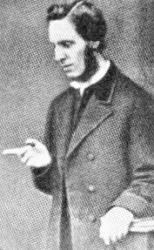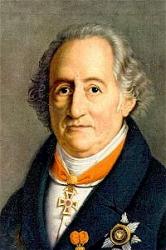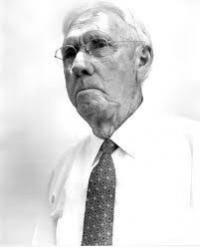Planning worship?
Check out our sister site, ZeteoSearch.org,
for 20+ additional resources related to your search.
- |
User Links
Person Results
‹ Return to hymnal




Export as CSV
Samuel O'Malley Cluff

1837 - 1910 Person Name: Samuel O. Clouph Hymnal Number: d143 Author of "I'm praying for you" in The New Alphabetical Hymnal Rv Samuel O'Malley Gore Cluff (Clough) United Kingdom 1837-1910. Born in Dublin, Ireland, he attended Trinity College and became a minister in the (Anglican) Church of Ireland. He pastored at various locations in Ireland. In 1884 he became leader of the Plymouth Brethren. He married Anne Blake Edge. They had four children. He wrote hymn poems and about 1000 songs. He composed many melodies and oratories. He died in Abbeyleix, Ireland. While holding crusades in Scotland with D. L. Moody, Ira Sankey came across Cluff's poem about prayer and composed the music for it, used in subsequent crusades.
John Perry
Samuel O'Malley Cluff
Maude Louise Ray
Hymnal Number: d446 Author of "My task" in The New Alphabetical Hymnal
Maude Louise Ray
S. Y. Harmer
1809 - 1884 Person Name: Samuel Young Harmer Hymnal Number: d175 Author of "Rest for the weary" in The New Alphabetical Hymnal Harmer, Samuel Young, son of Samuel Harmer, a member of the Society of Friends, was born at Germantown, Pennsylvania, Dec. 9, 1809. In 1827 he joined the American Methodist Episcopalian Church, and was engaged for several years as a Sunday School teacher and superintendent. In 1842 he became a local preacher of that body, and, in 1847, was admitted into the ministry. He has held appointments in Philadelphia and Iowa. His well-known hymn "In the Christian's home in glory" (Heaven) was written in 1856 for a camp-meeting collection which the Rev. John Gladding was then compiling. It has been slightly altered, and set to music by the Rev. W. McDonald of Boston, Massachusetts. (For these details we are indebted to Dr. Hatfield's Poets of the Church N. Y., 1884.)
-- John Julian, Dictionary of Hymnology, 1907
S. Y. Harmer
J. W. von Goethe

1749 - 1832 Hymnal Number: d322 Author of "Purer yet and purer I would be in mind" in The New Alphabetical Hymnal Goethe, Johann Wolfgang von, son of Johann Caspar Goethe, a lawyer at Frankfurt-am-Main; was born at Frankfurt Aug. 28,1749, and died at Weimar, March 22, 1832. The greatest German poet of his day, and one of the most famous literary men of his own or any age, his sympathies were Classical rather than distinctively Christian; and as he himself said (Conversations with Eckerman, January 4, 1827), he wrote no poems suited for use in public worship.
A few pieces, principally from his well-known dramatic poem of Faust (pt. i. 1808; pt. ii. pub. posthumously, 1832), are found under his name in one or two Unitarian hymn-books. Good translations of both parts of Faust have been published by Dr. John Anster, Bayard Taylor, Sir Theodore Martin, and others; while a very large number of other persons have published translations of the first part. No attempt has accordingly been made to notice any translations except those in the hymn-books.
i. From Faust, pt. i., 1808.
i. Christ ist erttanden! Freude dem Sterbliche. Easter. The chorus of angels on Easter Day. Translated as “Christ has arisen! Joy to our buried Head," by Dr. F. H. Hedge, in his Supplement to Hymns for the Church of Christ, Boston, U.S., 1853, No. 836. A free version is also noted under A. C. Cox, No. 4.
ii. Die Sonne tönt nach alter Weise. Praise. The Song of the three Archangels in the Prologue in Heaven. Translated as "The sun is still for ever sounding," by Dr. F. H. Hedge, as above, 1853, No. 190.
iii. Verlassen nab ich Feld und Auen. [Evening]. Faust's Soliloquy on entering his study with the dog, Translated as "O'er silent field and lonely lawn," as No. 21 in W. J. Fox's Hymns & Anthems, 1841, repeated in English and American Unitarian collections.
ii. Miscellaneous.
iv. Des Maurers Wandeln. Written for the Freemasons' Lodge at Weimar, of which he became a member in 1780, and included in his Werke, 1828, vol. iii. p. 61, entitled "Symbolum." Translated as "The Mason’s ways are A type of Existence," by T. Carlyle, in his Past and Present, 1843, p. 318. Included,beginning "The future hides in it" (st. ii.), as No. 854 in Dr. Hedge's Collection, 1853, as above.
Two pieces are also found in collections under his name, viz.:—
1. Without haste! without rest, in Hymns of the Ages, Boston, U.S., 3rd Ser., 1865, p. 76, and repeated as "Without haste and without rest," in Stopford Brooke's Christian Hymns, 1881, &c. It is suggested by " Wie das Gestern Ohne Hast, Aber Ohne Hast, Drehe sich jeder, Urn die eigne Last," in Goethe's Zahme Xenien, 2nd Ser., 1823 (Werke, 1828, iii. p. 245).
2. Rest is not quitting The busy career. [Rest]| This is part of a piece beginning "Sweet is the pleasure Itself cannot spoil." No. 853 in Dr. Hedge's Collection, 1853, as above, marked as by " J. S. Dwight." There does not appear to be any equivalent poem in Goethe's Werke. [Rev. James Mearns, M.A.]
--John Julian, Dictionary of Hymnology, (1907)
===========================
Goethe, J. W. von, p. 441, i. The Exeter Unitarian Hymns, Psalms and Anthems, of 1863 and 1884, contains the several additional hymns from Goethe, the translations in each case being by the Rev. T. W. Chignell. Some of the versions are very free, and the distinctively Christian character of the translations is only very faintly present in the originals. [Rev. James Mearns, M.A.]
--John Julian, Dictionary of Hymnology, Appendix, Part II (1907)
J. W. von Goethe
Austin Taylor

1881 - 1973 Hymnal Number: d328 Author of "Saints of God rejoice and sing" in The New Alphabetical Hymnal Austin Taylor (October 14, 1881 – January 1, 1973) Austin Taylor was born October 14, 1881 in Morgantown, Kentucky. He served Churches of Christ, one of three branches of the Stone-Campbell Movement for all of his long life as a song writer, song leader, minister, preacher, teacher, and singing school leader. The school he helped to found, the Texas Normal Singing School, still holds its camp every Summer.
The Taylors moved to Sherman, TX in 1890. There Austin began his music career as a singing school teacher and song writer. Two of his outstanding teachers were Horatio Richmond Palmer (1834-1907) of New York, who wrote songs such as “Master the Tempest is Raging,” “Angry Words,” and “O Lord, Our Lord,” and Dr. Horace Neely Lincoln (1859-1948) of St. Louis who specialized in lyrics.
His first song book, “The Gospel Messenger,” was published in 1905. He has published some twenty-five song books, just for [the] Firm Foundation in Austin, TX. His songs can be found in some fifty plus songbooks. Practically all the song books published by members of the church contain “Closer to Thee” and “Do All In the Name of the Lord.”
In the early part of the 1900’s churches received their musical instruction by singing conventions. Taylor continued teaching of singing conventions and influenced many students to follow. Some of his students began the Hartford Music Company in Nacogdoches, TX. Albert Brumley became a student of the Hartford school and later bought out the company. Austin Taylor paid the way for Will Slater to go with him to some of his schools. Slater later became a publisher and had his business in Fort Worth, TX. Frank Grammer, another student of Austin Taylor’s, founded a publishing company in California. Teaching conventions and singing for gospel meetings and revivals was a full-time career for Taylor.
Austin Taylor had created a good reputation for himself on the circuit of the singing conventions, so he started receiving many invitations to lead singing for gospel meetings. For many years this became one of his main works. In 1911 Austin Taylor was appointed as music editor of the Firm Foundation Publishing Co. operated by G. H. P. Showalter. The majority of his song books were sold between 1910 and 1930. They were printed in Cincinnati. In 1914 he published Gospel Songs No. 2 for the Firm Foundation. It sold over 500,000 in one year. There were nearly one million of the paperback copies sold in a 15-year period. Taylor published over 50 different hymn books in his lifetime, many at his own expense.
Edited by D. J. Bulls, from James Tackett, paperlesshymnal.com; "A Song is Born," Robert Taylor (2004 Taylor Publications);m "Our Garden of Song," Gene C. Finley (1980, Howard Publishing Co.) "The Songs of Austin Taylor," John R. Furr (Texas Normal Singing School), additional editing by Dianne Shapiro)
Austin Taylor
DeWitt Clinton Huntington

1830 - 1912 Person Name: D. W. C. Huntington Hymnal Number: d297 Author of "Over there" in The New Alphabetical Hymnal Rv DeWitt Clinton Huntington USA 1830-1912. Born at Townsend, VT, one of nine siblings, he attended Syracuse University, NY, and was ordained a Methodist Episcopal minister in 1853. He married Frances Harriett Davis in 1853, and they had three children: Charles, Thomas, and Horace. After her death in 1866, he married Mary Elizabeth Moore in 1868, and they had a daughter, Mary Frances. He pastored in Rochester, NY, (1861-71 & 1876-79), Syracuse, NY, (1873-76), Olean, NY, (1885-89), Bradford, PA, (1882-85 & 1889-91), and Lincoln, NE, (1891-96), where he became a Methodist District Superintendent of relief work. At his pastorate he also personally designed and oversaw construction of a brick sanctuary seating over 1100 people. A depression in 1893 caused him to forego salary for a number of months while pastoring. As things improved, he designed an addition to the church that was finally built two decades later. He was prevailed upon to serve as Chancellor of Nebraska Wesleyan University (1898-1908), at first without pay, and asked more than once to stay after desiring to retire. In 1908 he became Chancellor emeritus and assumed the role of professor of English Bible & Ethics. He also wrote several books, one titled, “Is the Lord among us?”. Another: “Half century messages to pastors and people”. Another: “A documentary history of religion in America since 1877”. He also served on the boards of the local telephone company and Windom Bank. He contracted pleura-pneumonia and died in Lincoln, NE. A Lincoln, NE, street is named for him, as is an elementary school. He was opposed to football, thinking it had no place in a proper Christian institution, but football was re-instituted at the college after his death.
John Perry
DeWitt Clinton Huntington
Eliza Holmes Reed
1794 - 1867 Person Name: Eliza Reed Hymnal Number: d271 Author of "O why not tonight" in The New Alphabetical Hymnal Reed, Eliza, née Holmes, was born in London, March 4, 1794; married to the Rev. Andrew Reed in 1816; and died July 4, 1867. Mrs. Reed entered fully and earnestly into her husband's extensive charitable works. Her publications include Original Tales for Children; and The Mother's Manual for the Training of her Children, 1865. Her hymns, 20 in all, were contributed to her husband's collection, and were republished with his in the Wycliffe Chapel Supplement, 1872. They are only of average merit, and have not attained to a marked position. They include:—
1. Gracious Lord, as Thou hast bidden. Holy Baptism.
2. I would be Thine, 0 take my heart . Dedication of Self to Christ.
3. 0 do not let the word depart. The Accepted Time.
4. 0 that I could for ever dwell. Communion with God Desired.
--John Julian, Dictionary of Hymnology (1907)
Eliza Holmes Reed
James Oren Thompson
1834 - 1917 Person Name: J. O. Thompson Hymnal Number: d77 Author of "Lord of harvest, send forth reapers" in The New Alphabetical Hymnal Born June 9, 1834 in Waldo, ME. He was a minister before joining the army and fighting in the Civil War. After the war he joined the Methodist Episcopal Maine Conference in 1866. He transferred to the Providence, RI conference and retired in 1886. He moved to Keyser, WV and edited The Mountain Echo. He then moved to Charleston, WV and served as secretary of the Agriculture. In 1905 he moved to St. Petersburg, FL where he was the minister at the First Ave. Methodist Church. He died Sept. 28, 1917.
From Hymn Studies http://homeschoolblogger.com/hymnstudies/
James Oren Thompson
J. G. Dailey
1854 - 1927 Hymnal Number: d498 Author of "He loved, he loved me so" in The New Alphabetical Hymnal Born: Circa March 1854, Delaware (was living in New Castle County in 1860).
Dailey moved to Brockwayville, Pennsylvania, with his mother in 1872, and was still there as of 1892. In 1900 he was in Fredonia Village, New York, and in Philadelphia, Pennsylvania, in 1910 & 1920. His works include:
A Collection of Gospel, Temperance, and Prohibition Songs, What’s the News (Brockwayville, Pennsylvania: 1888)
Love (Brockwayville, Pennsylvania: 1892)
Prohibition Chimes for Temperance, Prohibition and All Reform Meetings (New York: Dailey & Mead, 1900)
--www.hymntime.com/tch/
Additional information and photos can be found here:
James Gerald Dailey II (1854-1927) and Fear Not, Little Flock.
J. G. Dailey
Rebecca J. Weston
Hymnal Number: d84 Author of "Father, we thank thee [you] for the night" in The New Alphabetical Hymnal
Rebecca J. Weston


 My Starred Hymns
My Starred Hymns


